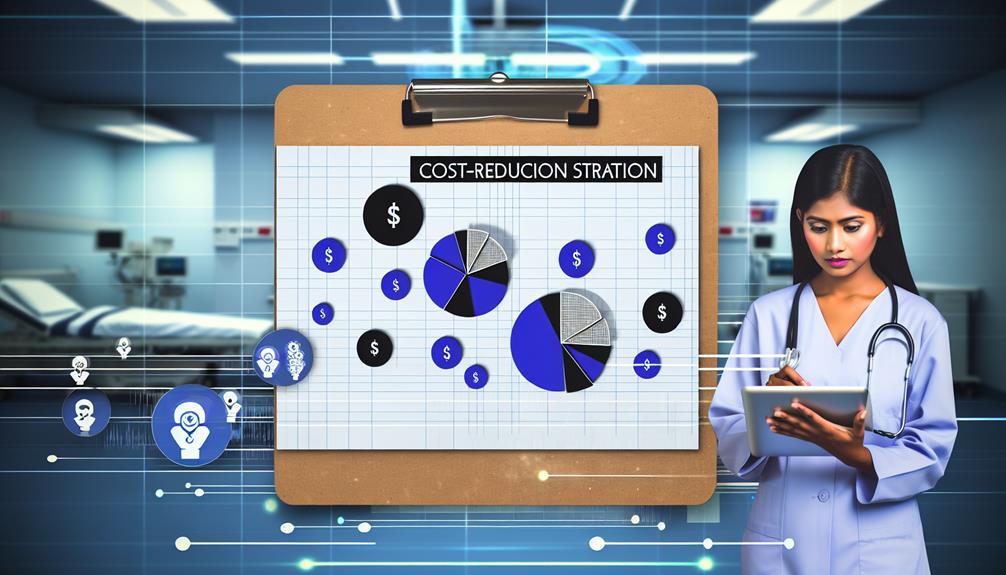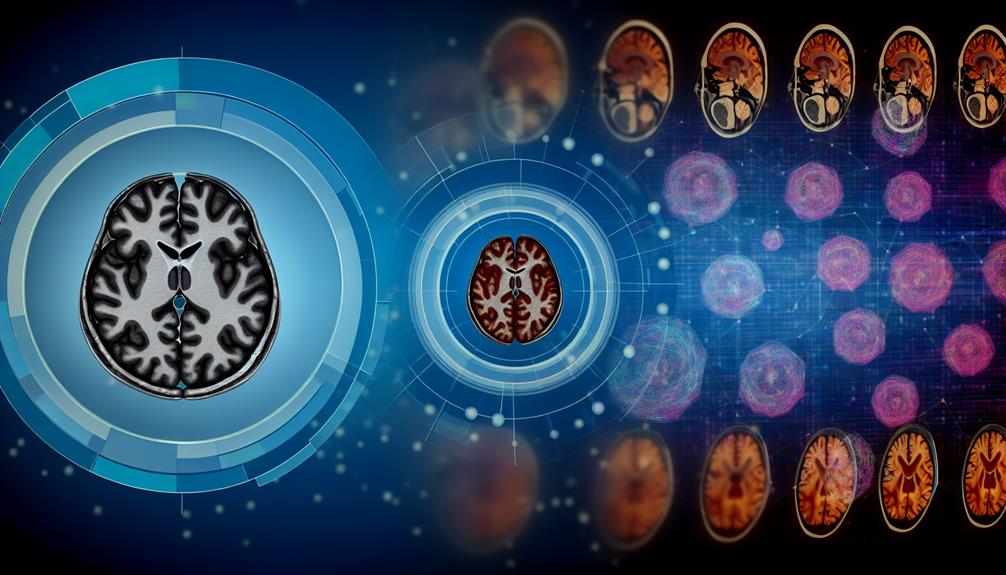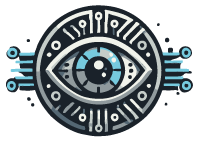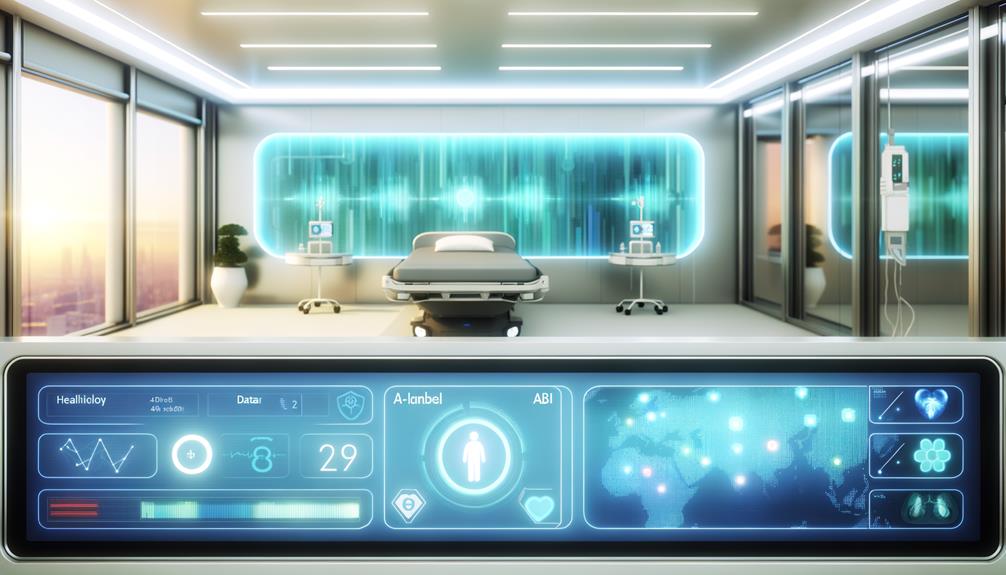Predictive analytics and artificial intelligence (AI) are enhancing healthcare by leveraging statistical computing, machine learning, and historical data analysis to identify high-risk patients, optimize resources, and develop personalized treatment strategies. This leads to enhanced diagnostic accuracy, improved clinical decision-making, and efficient cost reduction. AI-driven disease detection and personalized medicine offer timely interventions and more effective treatments. For more insights into AI's transformative impact on healthcare, expand on this concept.
Key Takeaways
- Real-time monitoring identifies potential health issues early, informing timely interventions and enhancing predictive analytics.
- AI facilitates personalized medicine by analyzing patient data to recommend customized treatments, improving outcomes and reducing adverse reactions.
- Predictive analytics leverages statistical models and machine learning to optimize treatment strategies, enhancing diagnostic accuracy and clinical decision-making.
- AI-powered systems streamline healthcare operations by automating routine tasks, reducing unnecessary office visits, and optimizing resource allocation.
- Integration of precision medicine and AI improves patient engagement by providing targeted health information and enhancing patient experience.
Predictive Analytics in Medicine
Predictive analytics in healthcare amalgamates statistical computing, machine learning, and historical data to enhance decision-making for healthcare professionals. By analyzing historical data, predictive analytics helps healthcare providers identify high-risk patients, optimize resource allocation, and improve patient outcomes.
This innovative approach enables clinicians to develop personalized treatment plans tailored to each patient's unique health situation, notably improving treatment effectiveness. Machine learning algorithms and statistical models are leveraged to uncover patterns and trends within medical data, allowing healthcare providers to make data-driven decisions.
Predictive analytics also facilitates proactive interventions by identifying potential problems before they occur. This proactive approach not only improves patient care but also reduces healthcare costs and enhances the overall efficiency of healthcare facilities.
As the healthcare industry continues to evolve, the integration of predictive analytics will play a key role in revolutionizing patient care. By combining historical data, advanced statistical algorithms, and machine learning techniques, healthcare providers can move towards a more proactive and data-driven approach to patient care.
Artificial Intelligence Advantages
Artificial intelligence plays a transformative role in healthcare by uncovering invaluable insights from patient data, which can greatly enhance diagnoses, optimize treatment strategies, and streamline clinical workflows. The integration of AI in healthcare facilitates the creation of personalized treatment plans tailored to individual patient needs, leveraging genetic data, medical history, and real-time health metrics.
Machine learning algorithms analyze vast datasets to identify patterns and trends, enabling healthcare providers to make informed decisions that improve patient outcomes. Predictive analytics powered by AI enables the early detection of potential health issues, allowing for timely interventions and preventative measures. This proactive approach not only saves lives but also leads to significant cost savings by reducing the need for lengthy hospital stays and resource-intensive treatments.
Moreover, AI-driven data analysis enhances diagnostic accuracy, minimizing human error and ensuring that clinicians have access to the most up-to-date and relevant information for clinical decision-making. By harnessing the capabilities of AI, healthcare providers can deliver more targeted, efficient, and effective care, ultimately revolutionizing the landscape of healthcare delivery.
Healthcare Cost Reduction Strategies

Through the strategic application of AI-driven predictive analytics, healthcare organizations are poised to substantially reduce costs by identifying high-risk patients for proactive interventions and optimizing resource allocation.
This approach not only saves lives but also yields significant financial benefits by:
- Reducing unnecessary office visits: AI-powered chatbots can help divert non-critical patients from in-person care, thereby reducing overhead expenses.
- Optimizing patient workflows: Predictive modeling enables proactive care delivery, improving patient adherence to treatment plans and reducing overall healthcare expenses.
- Streamlining resource allocation: By analyzing patterns in patient data, machine learning algorithms can make more informed decisions, ultimately saving costs in healthcare operations.
- Proactively identifying high-risk patients: Predictive analytics can pinpoint patients at higher risk for readmission, allowing for targeted interventions and cost savings.
Personalized Medicine Benefits
The paradigm shift towards personalized medicine leverages advanced predictive analytics and AI to enhance precision diagnosis and develop tailored treatment plans that cater to individual needs.
This approach considers the intricate interplay between genetic, environmental, and lifestyle factors to optimize healthcare outcomes.
Precision Diagnosis
Precision diagnosis, a cornerstone of personalized medicine, leverages advanced analytics and AI-driven insights to craft treatment strategies aligned with an individual's distinct genetic profile and health characteristics. This approach ensures treatment effectiveness by identifying specific genetic markers or biomarkers associated with a patient's condition. AI algorithms play a pivotal role in precision diagnosis by analyzing vast amounts of patient data to offer targeted therapies and interventions.
Key benefits of precision diagnosis include:
- Enhanced Treatment Effectiveness: By tailoring treatment plans to an individual's unique characteristics, precision diagnosis increases the likelihood of successful outcomes.
- Improved Patient Safety: AI-driven precision diagnosis helps predict treatment outcomes and potential side effects, leading to more personalized and efficient healthcare delivery.
- Personalized Healthcare: Precision diagnosis optimizes treatment strategies based on a patient's genetic makeup and environmental factors.
- Efficient Healthcare Delivery: By reducing trial-and-error approaches, precision diagnosis streamlines healthcare delivery, resulting in cost savings for both patients and healthcare providers.
Tailored Treatment Plans
Beyond identifying the right treatments through precision diagnosis, tailored treatment plans in personalized medicine further refine this approach by integrating predictive analytics to ensure each patient receives treatment specifically tailored to their unique genetic and health characteristics, leading to better outcomes and minimized side effects.
This precision is vital as genetic variations can greatly impact the efficacy and safety of medicines. By analyzing extensive health data, including genomic profiling, clinician's log, and medical histories, researchers and healthcare providers can identify specific genetic markers and biomarkers that define a patient's response to different treatments.
AI algorithms play a key role here, efficiently processing vast amounts of data to recommend personalized medications, dosages, and interventions for best results. By tailoring treatment plans to individual patients, personalized medicine enhances patient outcomes by addressing specific needs and minimizing potential adverse reactions.
This not only improves quality of life but also reduces healthcare expenses associated with inefficient treatments. Personalized medicine, enabled by predictive analytics and AI, is revolutionizing healthcare by making it more targeted and efficient.
Disease Detection Methods

Disease Detection Methods
————————-
One innovative approach to disease detection involves the utilization of predictive analytics, which empowers healthcare providers to identify patterns in patient data indicative of specific health conditions. This technology involves the analysis of vast amounts of data to pinpoint early signs of illnesses, enabling timely interventions and improved patient outcomes.
Predictive analytics in disease detection provides several distinct benefits. Here are four key aspects:
- Enhanced Accuracy: Machine learning models in disease detection can help healthcare providers make accurate diagnoses based on historical and real-time patient data.
- Early Identification: AI algorithms in disease detection can process vast amounts of data to pinpoint early signs of illnesses, allowing for timely interventions and improved patient outcomes.
- Personalized Medicine: Predictive analytics aids in personalizing treatment plans by identifying specific characteristics and risk factors for each individual patient.
- Improved Disease Surveillance: By leveraging predictive analytics, healthcare systems can enhance disease surveillance and management, leading to more efficient and effective healthcare delivery.
Predictive analytics notably enhances the efficiency and accuracy of healthcare by leveraging cutting-edge AI algorithms to analyze patient data, detect potential health issues, and inform holistic treatment strategies.
Ensuring Data Privacy Security
To safeguard the integrity and confidentiality of sensitive patient information, healthcare organizations must employ robust data security measures. Secure data storage relies on encryption protocols that adapt to the evolving threat landscape, safeguarding protected health information (PHI) both in transit and at rest.
Secure Data Storage
Guaranteeing the safeguarding of sensitive patient information is a critical component in healthcare settings, necessitating secure data storage. Robust encryption and access controls are essential to protect against unauthorized access and ensure compliance with strict regulations like HIPAA.
To secure the integrity of healthcare data, several key measures should be implemented:
- Encryption: Implementing encryption methods such as data-at-rest encryption, data-in-transit encryption, and endpoint encryption to protect data from unauthorized access.
- Robust Access Controls: Guaranteeing that only authorized individuals have access to healthcare data by utilizing multi-factor authentication, single sign-on, and role-based access control.
- HIPAA Compliance: Adhering strictly to regulations set by HIPAA to guarantee data privacy and security.
- Regular Security Audits: Conducting regular security audits and updates to guarantee the continued integrity of healthcare data and to protect against emerging threats.
Secure cloud storage solutions offer scalability and data redundancy for healthcare organizations, making them an attractive option.
The implementation of these measures helps maintain patient trust, ensures data privacy, and prevents data breaches. By prioritizing secure data storage, healthcare organizations can focus on delivering high-quality patient care while mitigating the risks associated with sensitive data management.
Encryption Protocols
High-quality encryption protocols are necessary for protecting sensitive patient data in healthcare AI systems. These protocols guarantee data privacy and security by encoding sensitive information, preventing unauthorized access or breaches.
Encryption algorithms used in healthcare AI systems safeguard patient data from data leaks, unauthorized use, and other security threats. Complying with healthcare regulations like HIPAA is essential, and encryption protocols help achieve this.
Maintaining patient trust and confidentiality is crucial in AI-driven healthcare services. Encryption protocols guarantee confidentiality by securing patient data, making it inaccessible to unauthorized parties.
Implementing robust encryption protocols is important for healthcare organizations handling sensitive data. Effective data encryption measures also adhere to HIPAA regulations, ensuring that patient information remains secure.
Future of Healthcare Security

As healthcare increasingly relies on digital technologies, AI-driven systems will play an essential role in protecting patient data from sophisticated cyber threats. The integration of predictive analytics and AI algorithms enables healthcare organizations to detect anomalies in real-time, preventing data breaches and unauthorized access.
To fortify healthcare security, AI-powered systems will:
- Identify Potential Risks: Predictive analytics can anticipate potential security risks and vulnerabilities in healthcare systems before they occur.
- Detect Anomalies: AI algorithms can detect anomalies in healthcare networks to prevent data breaches and unauthorized access.
- Implement Real-Time Monitoring: AI-driven systems will provide real-time monitoring and response to cyber threats, safeguarding sensitive medical data.
- Enhance Cybersecurity Measures: The integration of AI will enhance cybersecurity measures, ensuring the security and privacy of patient information in the face of rising telemedicine and digital health platforms.
AI Impact on Health Disparities
Artificial intelligence has the potential to revolutionize healthcare by lessening health disparities through its ability to personalize medicine, enhance clinical decision-making, and optimize patient outcomes, notwithstanding concerns about algorithmic bias, data privacy, and potential job displacement.
AI empowers healthcare professionals to develop personalized care plans tailored to individual patient needs. This approach ensures that treatment strategies are more effective and accessible for diverse populations. By enhancing patient engagement and providing targeted education, AI can greatly improve health outcomes.
However, it is important to address ethical concerns surrounding the privacy and security of patient data in AI applications. Additionally, job displacement is a risk as AI automates tasks, requiring healthcare professionals to adapt their practices.
Despite these challenges, AI has significant potential to improve patient outcomes and reduce disparities in healthcare delivery. By leveraging AI to enhance patient care and address systemic inequalities, we can create a more equitable healthcare system that serves all individuals better.
Task Automation Efficiency

By automating repetitive administrative tasks through artificial intelligence, the healthcare industry can realize substantial gains in operational efficiency, allowing clinical professionals to redirect their valuable time and expertise towards direct patient care. This shift in focus notably improves the quality of care provided, ultimately leading to better patient outcomes.
The advantages of AI-powered automation in healthcare are multifaceted:
- Streamlined Operations: AI can handle routine administrative tasks such as scheduling appointments, data entry, and billing, freeing healthcare providers to focus on patient care.
- Enhanced Accuracy: Automation reduces errors and inaccuracies that can be detrimental in healthcare.
- Efficient Resource Allocation: AI enables healthcare providers to allocate resources more effectively, leading to faster treatment times and better resource management.
- Personalized Patient Experience: AI automation allows healthcare professionals to invest more time in personalized interactions, notably enhancing the overall patient experience.
Improved Patient Engagement
In the field of healthcare, AI-powered tools and predictive analytics have emerged as pivotal forces in enhancing patient engagement. By providing instant responses and personalized support, these technologies foster effective communication and education, empowering patients to take a more proactive role in managing their health.
Additionally, AI-driven chatbots and virtual health assistants offer tailored care management and access to health information, critical components in improving patient engagement and health outcomes.
Patient Care Management
Advancements in AI-driven tools and predictive analytics are revolutionizing patient care management through enhanced patient engagement, personalized treatment plans, and proactive issue prevention. These innovations lead to significant improvements in healthcare outcomes while reducing costs.
4 Key Innovations in Patient Care Management:
- AI-driven Chatbots: Improve patient engagement by providing immediate access to health information, enabling patients to stay informed about their health and communicate effectively with healthcare professionals.
- Predictive Analytics: Identify high-risk patients, enabling healthcare providers to tailor personalized treatment plans, reducing hospital readmissions and associated costs.
- Personalized Therapies: AI-driven genomic analysis helps design targeted treatments, optimizing dosages and reducing adverse reactions, leading to better patient outcomes.
- Proactive Care: AI-driven systems enable healthcare providers to proactively address potential health issues, reducing healthcare costs and enhancing patient satisfaction.
Health Information Access
Artificial intelligence and predictive analytics have greatly improved patient engagement by providing personalized access to health information, empowering patients to better manage their treatments and health conditions. AI-powered chatbots respond instantly to health inquiries, enabling patients to receive real-time support and guidance.
This access to personalized health information allows patients to actively participate in their healthcare decisions and treatment plans, leading to better health outcomes and satisfaction.
Predictive analytics also enables healthcare providers to offer customized recommendations based on individual health data, fostering a more engaged and informed patient population. For instance, healthcare chatbots can provide patients with detailed information on appointment scheduling, medical costs, and past health records.
AI-driven solutions further enhance the patient experience by offering intuitive self-service patient portals where patients can manage their health information, schedule appointments, and receive personalized insights.
Frequently Asked Questions
What Are Ai's Predictive Capabilities in Healthcare?
AI's predictive capabilities in healthcare leverage data analysis and statistical algorithms to forecast future outcomes based on historical data, enhancing patient outcomes, disease prevention, early detection, treatment optimization, cost reduction, risk management, personalized care, and resource allocation.
How Is AI Used in Healthcare Analytics?
AI in healthcare analytics optimizes patient outcomes by predicting disease onset, enhancing treatment effectiveness, and allocating resources efficiently. It facilitates early detection, personalized care, risk assessment, and preventive measures, ultimately leading to significant cost savings and improved treatment outcomes.
How Does Predictive Analytics Help Healthcare?
Predictive analytics in healthcare improves diagnosis, facilitates better treatments and early detection through data-driven insights, ultimately optimizing patient outcomes while providing personalized care and reducing costs via improved risk management and efficient workflows.
How Does AI Help With Predictive Analytics?
AI enhances predictive analytics through machine learning, data analysis, and real-time monitoring to identify high-risk patients, optimize treatment plans, and prevent diseases, leading to improved patient outcomes and reduced healthcare costs.









